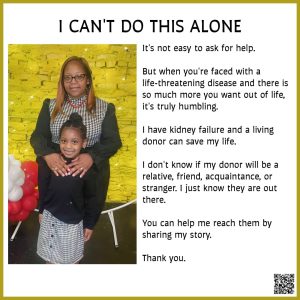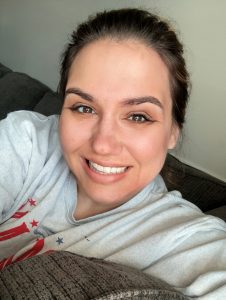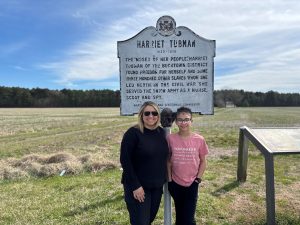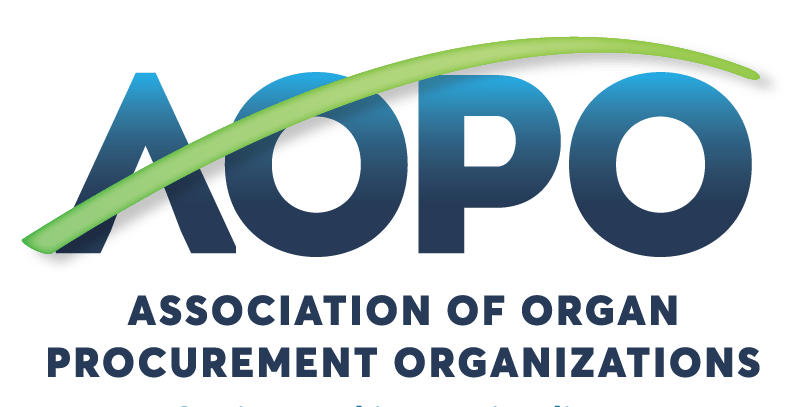Stephanie Wiggins, a Quality Assurance Coordinator at HonorBridge, is part of a remarkable group of people who choose to give the gift of life through living donation. Her decision to donate a kidney through The Great Social Experiment—a social media-based movement connecting donors with recipients—saved not just one life, but two. At HonorBridge, we are incredibly proud to have dedicated team members like Stephanie, whose personal commitment to saving lives extends far beyond the workplace.
Stephanie has worked in the clinical field for more than 12 years, gaining experience in “a little bit of everything,” from trauma to family medicine. She first encountered the world of organ donation while working in a hospital, where she saw firsthand the impact of Organ Donation Coordinators (ODCs) and Family Services Coordinators (FSCs) on grieving families.
“They were very powerful, and it was so moving, so rewarding,” says Stephanie. “They looked like they loved their job, and that’s where I wanted to be. Giving back and having a rewarding career is something I’m very passionate about.”
The desire to help others is deeply rooted in Stephanie’s personal history. Now 35 and a single mother for the past 13 years, Stephanie has faced more than her fair share of hardship, including the loss of both parents just six months apart at age 20, and the heartbreaking loss of two children. But through it all, her experiences have shaped her into someone who is deeply committed to helping others.
“Eastern NC is very rural from a healthcare standpoint,” says Stephanie, who has witnessed firsthand the struggles and lack of resources that many families in the region face. “I come from a very traumatic and troubled childhood in life, and I beat the odds. And so, giving back is something that I’m very passionate about. I feel like I’m in a place to be able to be empathetic versus sympathetic with these people in their situations—that’s kind of what led me here.”
In March 2023, Stephanie began seriously exploring living donation. Though no one in her immediate life needed a kidney, she couldn’t ignore the need she saw in her community.
“Some of these people in Eastern NC are not able to survive because they need a kidney or a liver,” she said. “When you live here, one in three people can’t read or write. If you can’t adequately read or write, you’re not going to get the proper medical care or have the knowledge of what you really need.”
Stephanie credits much of her giving spirit to her late father, a man who overcame addiction and devoted his life to helping others in the Charlotte community. Despite his own struggles, he employed the homeless through his landscaping business, ran a halfway house for men in recovery, and helped coordinate the Room in the Inn shelter program. With that, he made such a lasting impact that a “housing first” apartment for the homeless, called Moore’s Place, named its welcome center in his honor.
“He was very giving, even when he didn’t have, and if he didn’t have, he was always willing to go above and beyond to try and help,” she says. “A lot of my determination came from there.”
She took the first steps on her own: scheduling preventive screenings and researching what it meant to be a living kidney donor. Soon after, she came across a post by The Great Social Experiment on Facebook.
“I didn’t want to just go through the registry and have it be completely random,” says Stephanie. “I prayed about it and put it in God’s hands, and I said if it’s meant to be, it’s meant to be. I saw several stories on The Great Social Experiment and shared them. I saw a post about a young lady named Jalesa Smith. It was a sad story—like me, she was a single mom, and she had been on dialysis for a year and a half. She was in her 30’s at the time. Her parents weren’t a match, her sister wasn’t a match. I shared her story and then let it go.”

In June 2024, Stephanie applied for a position at HonorBridge and officially joined the team that August. Coincidentally, or perhaps fatefully, HonorBridge had been partnering since the spring with The Great Social Experiment as an “Angel Advocate,” helping share the stories of kidney patients in need to connect them with potential living donors. One of those stories was Jalesa’s, a woman Stephanie had already come across on social media months earlier.
“Once I started working here, I responded to the call to be an Angel Advocate,” Stephanie said. “And then, HonorBridge shared her story. I felt like it was meant to be. I had found her on my own, and then she showed up again through my job. I said, ‘God, if this is you talking to me, this is twice now.’ So, I messaged her privately and told her I wanted to try and be her living donor.”
In October 2024, Stephanie began the evaluation process at ECU Transplant.
“I was really quiet about it because I didn’t want to get my hopes up and get everybody involved in case I didn’t match,” she recalls. “I filled out the application, got a phone call a couple of days later, and set up an appointment to come in. I met with the entire team at ECU Transplant, including a living donor coordinator, social worker, surgeon, and a nephrologist. It was a very, very in-depth process.”
After months of tests, scans, and blood draws, Stephanie finally received the phone call in December saying she was approved.
“I don’t know if it was miscommunication or not, but I had asked if I was a perfect match for Jalesa, and I was told yes,” she says. “I reached out to Jalesa and told her that I was a match, and tears of joy were shared between both of us. A couple of days later, I got a phone call that I was not a perfect match. It was very disheartening, very discouraging.”
Stephanie was then asked if she’d be willing to enter the National Kidney Registry (NKR), which facilitates kidney paired exchanges—allowing donors and recipients to be matched with compatible partners across the country.
Stephanie agreed, but with one condition: “I said, well yes, as long as you can promise me that she gets a kidney before or on the same day that I give mine. And they said we can make that happen.”
By early January 2024, Stephanie and Jalesa were approved for the NKR. On January 21, they got the call they’d been waiting for: they were paired, and their surgery was scheduled for February 19.
“My surgery was about four hours long,” says Stephanie. “I woke up and did great. Complications from the surgery are very minimal; it’s kind of similar to a gallbladder removal. Jalesa’s surgery was delayed a little due to an ice storm, but she did well and was up and walking the next day. I had some minor complications with anesthesia, so I wasn’t up and walking as fast, but once my body got rid of all the anesthesia, I was great.”

Jalesa’s kidney came from out west, while Stephanie’s kidney went to someone in Pennsylvania—resulting in two lives saved by the power of donation.
“Although I’m not Jalesa’s actual donor, she tells everyone I am because, without me, she wouldn’t have a kidney,” says Stephanie. “It’s wonderful because, in a way, I’ve saved two lives. Her kidney is functioning so well that it doesn’t even look like she’s had a transplant. I’d love to learn more about my kidney recipient, but I’m unsure if they prefer to stay anonymous. Personally, I’d love to connect and get to know them.”
For those who are considering becoming a living kidney donor, Stephanie can’t stress enough how thoroughly her own health and well-being were prioritized by her transplant team.
“The process is intense, but I’ll tell you, it’s very protective,” she says. “If there’s a reason you don’t qualify, it’s for your best interest, it’s not because they don’t want it. Dr. McLawhorn told me, ‘If I can’t guarantee you 50 more years of your life on your labs, I don’t want your kidney.’ That really meant a lot to me.”
Since her surgery, Stephanie has enjoyed a smooth recovery and speaks to Jalesa on a weekly basis.
“We’ve developed a good bond,” she says. “She has a little girl named Royale, and she’s the sweetest little thing. She makes me cry every time I talk to her, because she’s just so grateful that her mom was able to get a new kidney. Now they can have more time and a better life together. Overall, I’ve had great support—my colleagues have been amazing, and I work for a great organization.”

As a living donor and HonorBridge employee, Stephanie lives her life with empathy and gratitude and encourages people to check out The Great Social Experiment on social media.
“People deserve second chances in life,” she says. “If I had an extra one to give, I would give it again. Growing up, I didn’t fully understand how to be grateful, so it took a lot of self-growth and motivation to learn how to give back—not just to those who helped me through my troubled times, but to everyone. I wasn’t a perfect match for Jalesa, but we still built that connection, and I was still able to help her. Trust me, two kidneys are overrated!”
Nearly 4,500 North Carolina patients are waiting for lifesaving transplants, and 88% of those waiting need kidney transplants. Whether you choose living donation or donation after death, you can make a difference!


